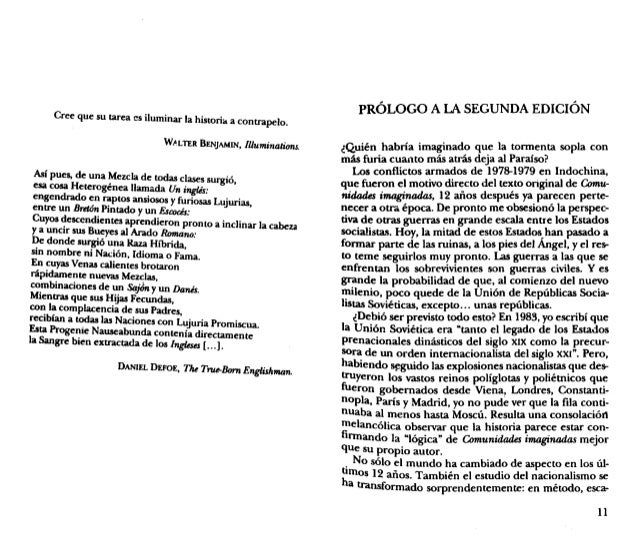Anderson-Benedict-Comunidades-Imaginadas.pdf - Google Drive. An imagined community is different from an actual community in that it is not—and, for practical reasons, cannot be—based on everyday face-to-face interaction among its members. It is a concept coined by Benedict Anderson to analyze nationalism. The full magnitude of Benedict Anderson's intellectual achievement is still being appreciated and debated. Imagined Communities remains the most influential.

The full magnitude of Benedict Anderson’s intellectual achievement is still being appreciated and debated. Imagined Communities remains the most influential book on the origins of nationalism, filling the vacuum that previously existed in the traditions of Western thought. Cited more often than any other single English-language work in the human sciences, it is read around the world in more than thirty translations. Written with exemplary clarity, this illuminating study traces the emergence of community as an idea to South America, rather than to nineteenth-century Europe. Later, this sense of belonging was formed and reformulated at every level, from high politics to popular culture, through print, literature, maps and museums.
Following the rise and conflict of nations and the decline of empires, Anderson draws on examples from South East Asia, Latin America and Europe’s recent past to show how nationalism shaped the modern world.
'Imagined communities' redirects here. For the book, see. An imagined community is a concept developed by in his 1983 book, to analyze. Anderson depicts a as a socially constructed community, imagined by the people who perceive themselves as part of that group.: 6–7 The also creates imagined communities, through usually targeting a mass audience or generalizing and addressing citizens as the public. Another way that the media can create imagined communities is through the use of images.
The media can perpetuate stereotypes through certain images and vernacular. By showing certain images, the audience will choose which image they relate to the most, furthering the relationship to that imagined community. Contents • • • • • • Origin [ ] According to Anderson, creation of imagined communities became possible because of '. Capitalist entrepreneurs printed their books and media in the (instead of exclusive script languages, such as ) in order to maximize circulation. As a result, readers speaking various local dialects became able to understand each other, and a common discourse emerged. Anderson argued that the first European nation-states were thus formed around their 'national print-languages.'
Nationalism and imagined communities [ ] According to Anderson's theory of imagined communities, the main causes of nationalism are the declining importance of privileged access to particular script languages (such as ) because of mass vernacular literacy; [ ] the movement to abolish the ideas of rule by divine right and hereditary monarchy; [ ] and the emergence of printing press capitalism ('the convergence of capitalism and print technology. Standardization of national calendars, clocks and language was embodied in books and the publication of daily newspapers') —all phenomena occurring with the start of the. While attempting to define nationalism, Anderson identifies three paradoxes: '(1) The objective modernity of nations to the historians' eyes vs.
He sheds some revealing light on the hacker culture that led to the birth of the Internet. Castells the internet galaxy pdf merger.
Download buku paud gratis pdf 2017. Their subjective antiquity in the eyes of nationalists. (2) The formal universality of nationality as a socio-cultural concept [and] (3) the 'political' power of such nationalisms vs. Their philosophical poverty and even incoherence.' Anderson talks of Unknown Soldier tombs as an example of nationalism. The tombs of Unknown Soldiers are either empty or hold unidentified remains, but each nation with these kinds of memorials claim these soldiers as their own. No matter what the actual origin of the Unknown Soldier is, these nations have placed them within their own imagined community. Nation as an imagined community [ ] He defined a nation as 'an imagined political community'.